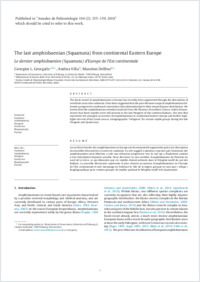The last amphisbaenian (Squamata) from continental Eastern Europe
- Georgalis, Georgios L. Department of Geosciences, University of Fribourg, Switzerland - Dipartimento di Scienze della Terra, Università di Torino, Italy
- Villa, Andrea Dipartimento di Scienze della Terra, Università di Torino, Italy
- Delfino, Massimo Dipartimento di Scienze della Terra, Università di Torino, Italy - Institut Català de Paleontologia Miquel Crusafont, Universitat Autònoma de Barcelona, Spain
-
01.04.2018
Published in:
- Annales de Paléontologie. - 2018, vol. 104, no. 2, p. 155–159
English
French
The fossil record of amphisbaenians in Europe has recently been augmented through the description of new finds across the continent. It has been suggested that the post- Miocene range of amphisbaenians followed a progressive southward constriction that ultimately lead to their extant disjunct distribution. We herein describe amphisbaenian vertebral material from the Pliocene of northern Greece, which demonstrates that these reptiles were still present in the late Neogene of the southern Balkans. The new find represents the youngest occurrence of amphisbaenians in continental Eastern Europe and further highlights the role of the Greek area as a biogeographic “refugium” for certain reptile groups during the late Neogene and Quaternary.
Les archives fossiles des amphisbaeniens en Europe ont récemment été augmentées grâce à la description de nouvelles découvertes à travers le continent. Il a été suggéré à plusieurs reprises que l’extension des amphisbaeniens post-Miocène a subi une réduction progressive vers le sud qui a finalement conduit à leur distribution disjointe actuelle. Nous décrivons ici une vertèbre d’amphisbaenien du Pliocène du nord de la Grèce, ce qui démontre que ces reptiles étaient présents dans le Néogène tardif du sud des Balkans. La nouvelle découverte représente la plus récente occurrence d’amphisbaeniens en l’Europe de l’Est continentale et met davantage en évidence le rôle de la région grecque en tant que « refuge » biogéographique pour certains groupes de reptiles pendant le Néogène tardif et le Quaternaire.
- Faculty
- Faculté des sciences et de médecine
- Department
- Département de Géosciences
- Language
-
- English
- Classification
- Palaeontology
- License
- License undefined
- Identifiers
-
- RERO DOC 322872
- DOI 10.1016/j.annpal.2018.03.002
- Persistent URL
- https://folia.unifr.ch/unifr/documents/307208
Statistics
Document views: 74
File downloads:
- geo_las.pdf: 206
